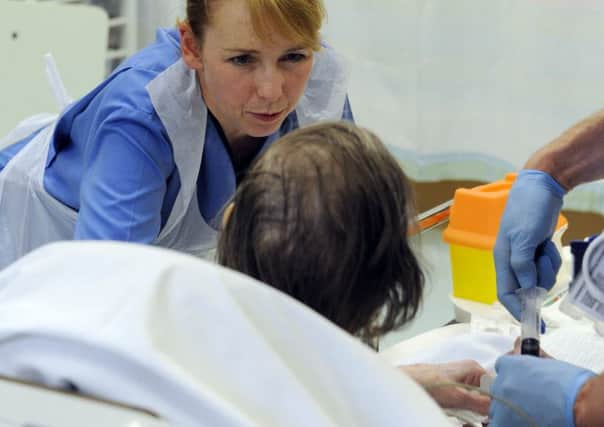Innovation to strokes gives patients better chance


When your drain blocks you have two alternatives. Use a chemical to dissolve the block or call Dyno-rod. These same principles are now being applied to help stroke patients.
An exciting new treatment which can rapidly unblock arteries in the brain has been shown to offer a cure to hundreds of patients who are having an acute stroke, say stroke specialists and health charity Chest Heart & Stroke Scotland (CHSS).
Advertisement
Hide AdAdvertisement
Hide AdAbout 8,000 people are admitted to Scottish hospitals with an acute stroke each year. Most of these strokes are due to a blocked artery to the brain. When the artery blocks, millions of brain cells die every minute. The longer the blocked artery persists the worse the brain damage, and the greater the risk of permanent disability. Some patients will die and many others will be left with weakness of arms and legs, difficulties with speech and swallowing and loss of vision. Many surviving patients require constant care, often in nursing homes. Currently, the best available treatment in Scotland is an injection of a clot busting drug, alteplase. About 800 patients a year receive this treatment, with the number increasing year on year. The drug can only be given if patients with a blocked artery arrive in hospital very soon after their first symptoms – a maximum of four and a half hours.
The increasing number of patients treated is due to efforts by charities like CHSS, stroke specialists and the Scottish Ambulance Service to improve both public and professional awareness of acute stroke to reduce the so called “door to needle” times.
The treatment is more effective the earlier it is started – Time is Brain. However, this treatment only helps one in ten patients treated.
This year, for the first time, a new treatment, clot retrieval, has been shown to rapidly unblock those arteries which may not respond to alteplase. A specialist puts a fine tube into an artery in the groin and steers this into the blocked artery in the brain, then removes the clot with a device called a stentriever. Trials have shown that if this can be done early, ideally within six hours of symptoms onset, then the patient has a much better chance of making a good recovery.
This is far more effective than any other treatment available. This benefit is over and above that from clot busting alone and can sometimes be used even when patients cannot safely be given clot busting drugs. It is likely that 300 to 500 patients could potentially benefit from clot retrieval in Scotland each year. If this could be delivered, then over 100 people would avoid serious disability and many others would achieve improved outcomes from their stroke.
At the moment this exciting new treatment can only be delivered in Scotland to patients who happen to arrive at one of very few hospitals who can carry out clot retrieval, at a time when the specialist doctor and facilities happen to be free. There are too few specialists with the technical skills to carry out clot retrieval to patients across Scotland whenever their stroke occurs, day or night. More specialists need to be trained and appointed.
Most patients will still be assessed and treated in their local hospital but will then need to be very quickly transferred to a specialist centre. This will require much more efficient transfers between hospital than currently exist.
Profesor Martin Dennis, the Chair of the Scottish Government’s national advisory committee for stroke said: “This is the most exciting development in my 30-year career caring for stroke patients. At last we have a treatment which can prevent disability in those having a severe stroke.”
Advertisement
Hide AdAdvertisement
Hide AdMark O’Donnell, chief executive of Chest Heart & Stroke Scotland (CHSS) said: “There now needs to be a national, properly resourced strategy to take us to the next stage, which this exciting new development offers”
One stroke victim who has benefited from this treatment is Peter Stalker
Life might have been very different for him if his wife hadn’t spotted the tell-tale symptoms that he might be having a stroke and immediately dialled 999. She was right to do so because doctors at Edinburgh’s Western General Hospital identified that he was suitable for a clot retrieval operation. He’s been making a steady recovery ever since and is helping CHSS spread the word about taking fast action if a stroke is suspected.
SEE ALSO